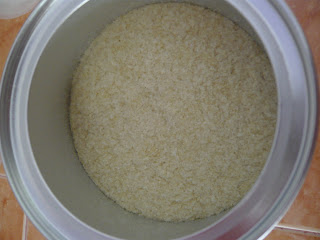Should we add in additional salt or sugar when we prepare our baby's food??? The answer is "NO"
Babies are born with four times more taste buds then we have as adults (did you know... a baby is born with about 12000 taste buds? By the time we get to middle age, we have only 3000), so foods are very tasty to them and you shouldn't prepare your baby's food to suit your taste. Baby hasn't acquired a taste for salt and sugar, so don't add it.
In fact, their kidneys can't handle large amounts of sodium (salt), which is probably why Mother Nature made breast milk a very low-sodium drink (with only 5 miligrams of sodium per 250ml as compared to 120 milligrams per 250mls of cow's milk). And there is some evidence that too much salt too soon, especially when there is a family history of hypertension, can set the stage for high blood pressure in adulthood. A high-sodium diet early in life can also nurture a lifelong taste for the salty stuff.
source: Breast Bottle Bowl by Anne Hillis & Penelope Stone
What to Expect The First Year by Heidi Murkoff, Arlene Eisenberg &
Sandee Hathaway












